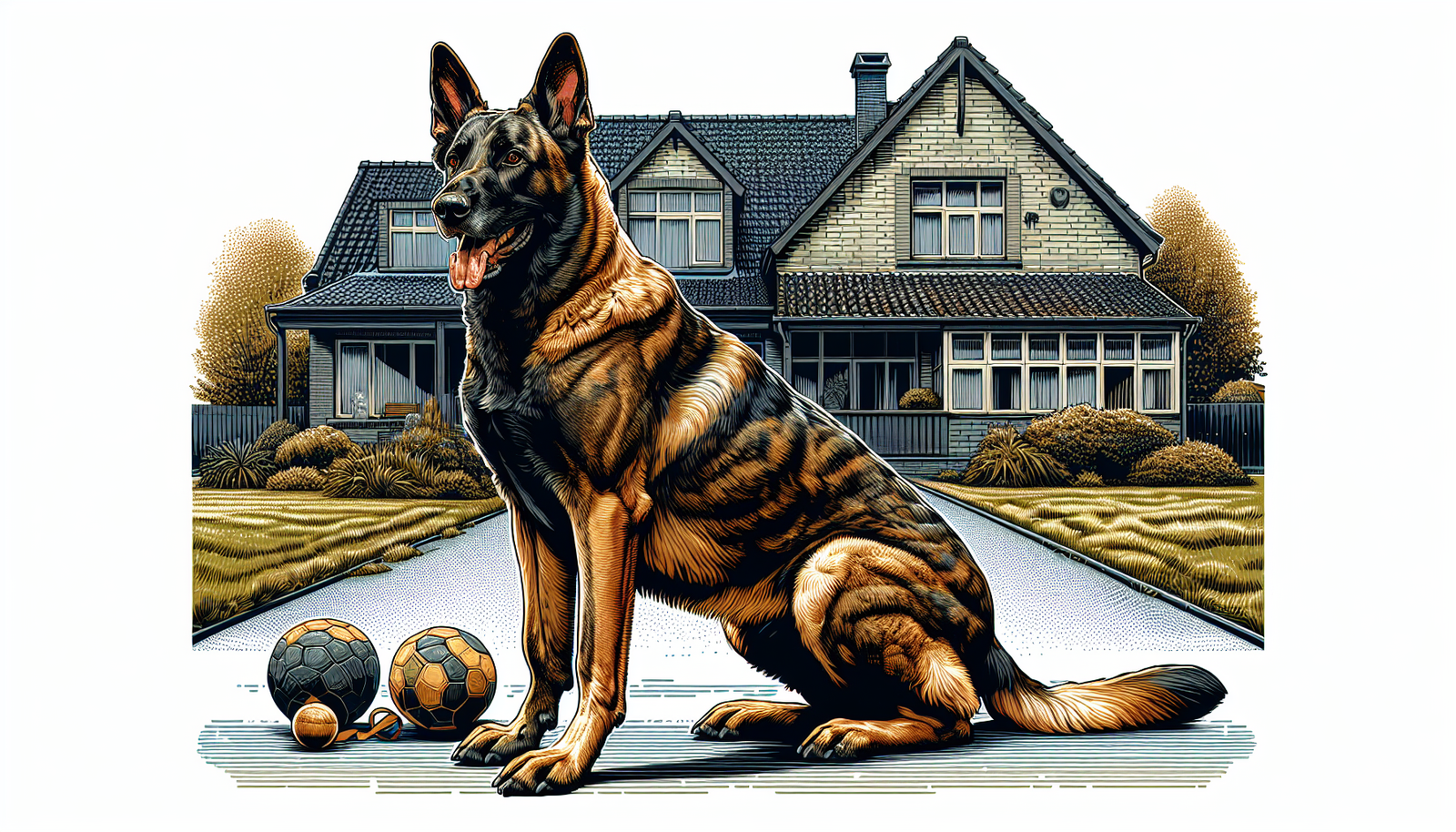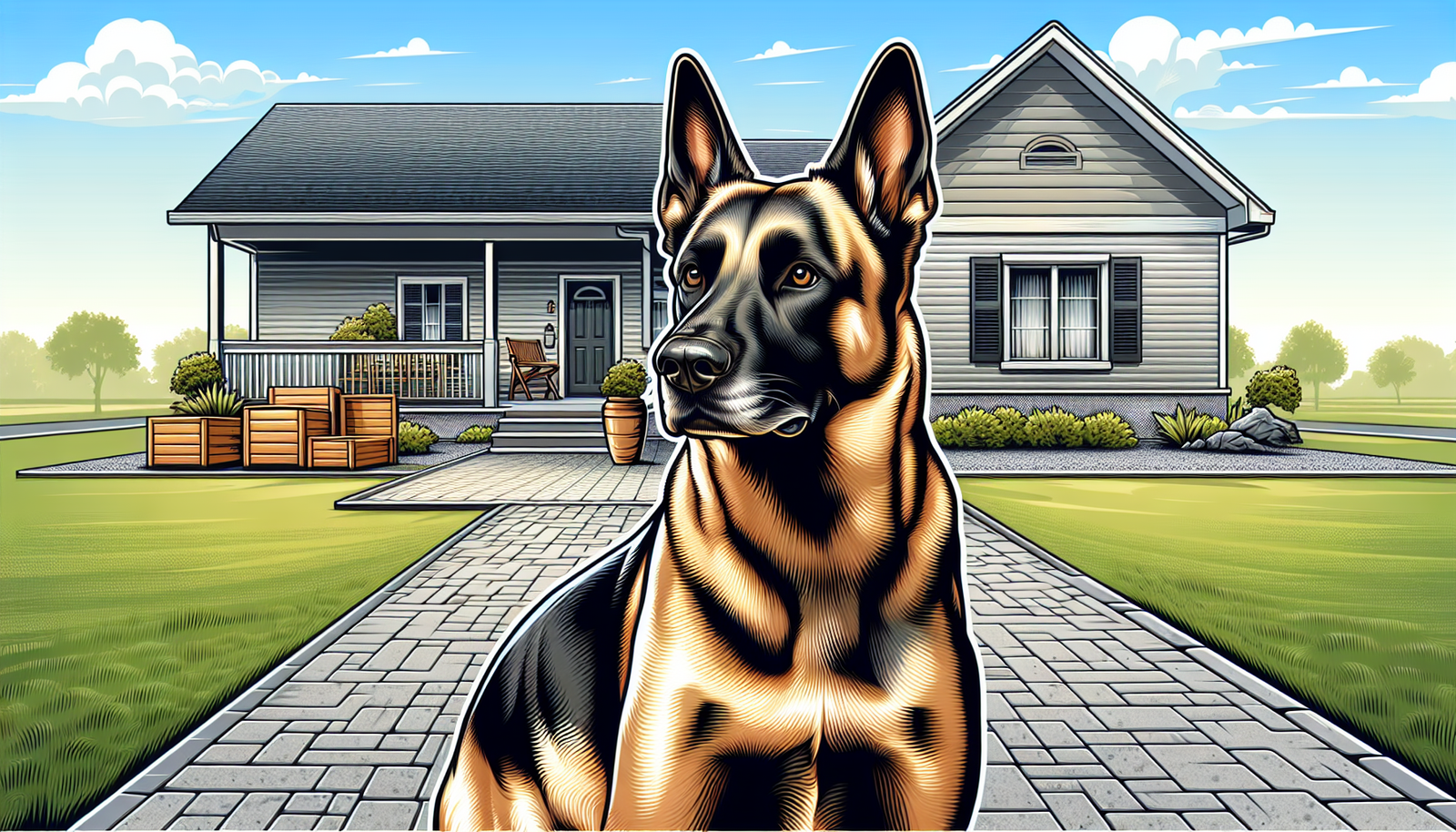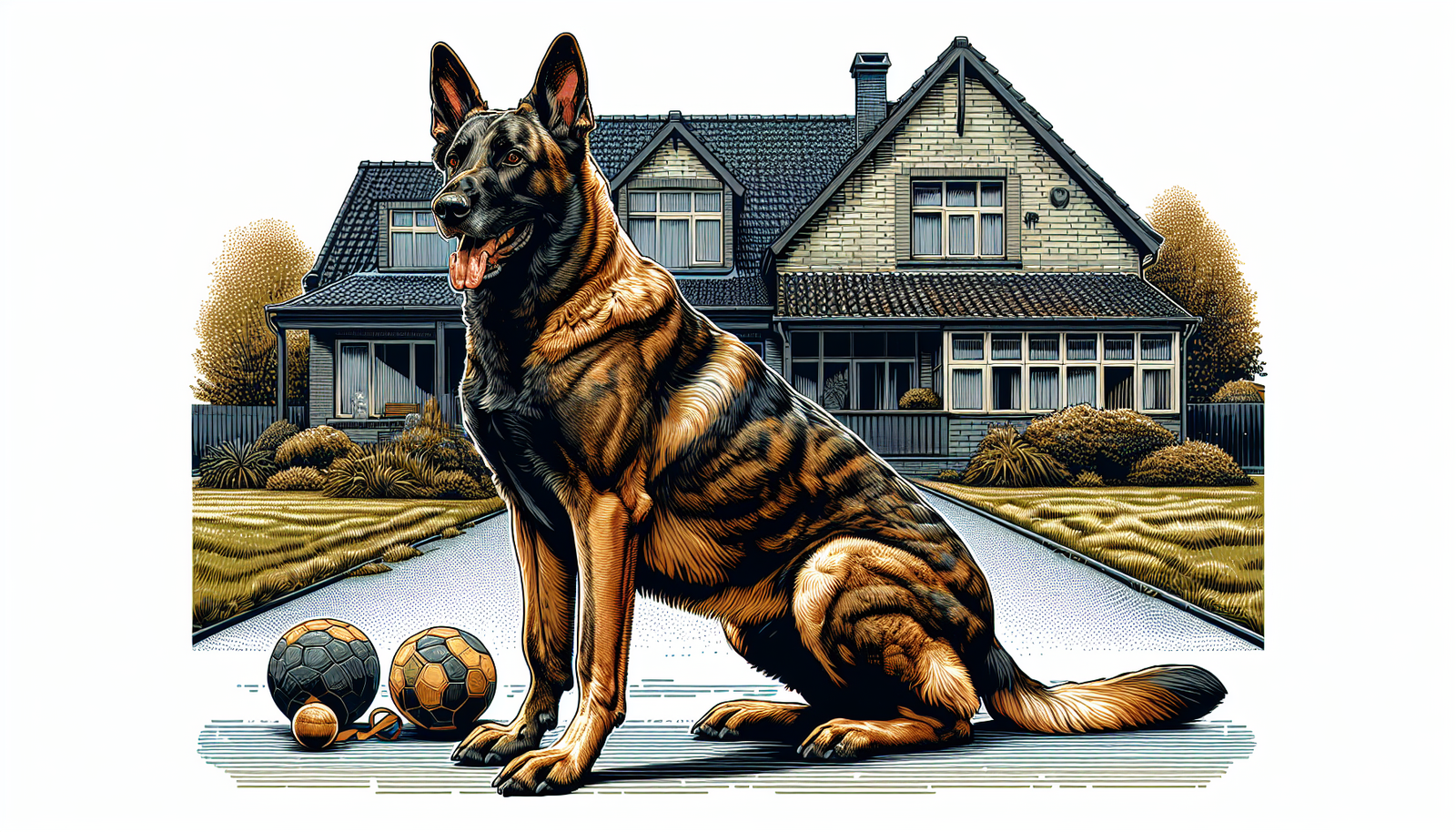If you’re in search of a trusty guardian for your home, look no further than the remarkable Dutch Shepherd. Renowned for their unwavering loyalty and fierce protective instincts, Dutch Shepherds excel in the role of guard dogs. With their impressive strength, alertness, and keen intelligence, these canines possess all the necessary qualities to ensure the safety and security of your property. Whether it’s keeping intruders at bay or instilling a sense of comfort within your family, the Dutch Shepherd’s innate protective nature truly sets them apart.

Physical Characteristics of Dutch Shepherds
Appearance
Dutch Shepherds are medium-sized dogs with a strong and athletic build. They have a well-proportioned body that exudes power and agility. Their head is wedge-shaped, with a strong jawline and expressive almond-shaped eyes. They have erect ears and a well-muscled neck. The Dutch Shepherd’s body is slightly longer than it is tall, giving them a balanced and elegant appearance.
Coat Type
The Dutch Shepherd has a short and dense double coat that provides them with protection against varying weather conditions. Their coat comes in three different varieties: short-haired, long-haired, and rough-coated. Short-haired Dutch Shepherds have a smooth and shiny coat, while the long-haired variety has a feathery and wavy coat. The rough-coated Dutch Shepherds have a dense and harsh coat. Regardless of the coat type, they all have a dense undercoat that keeps them warm in colder climates.
Size and Weight
Dutch Shepherds are medium-sized dogs, with males typically standing between 22 to 24 inches at the shoulder and weighing between 55 to 67 pounds. Females are slightly smaller, standing between 21 to 23 inches and weighing between 44 to 55 pounds. Their size and weight make them agile and nimble, allowing them to excel in various physical activities.
High Energy Levels
Dutch Shepherds are known for their high energy levels. They are active and require plenty of exercise to keep them physically and mentally stimulated. Regular exercise is vital to prevent boredom and destructive behavior. They thrive in homes that can provide them with ample opportunities for physical activities such as long walks, jogs, and play sessions. A tired Dutch Shepherd is a happy and well-behaved companion.
Temperament and Trainability
Protective Nature
Dutch Shepherds have a protective nature ingrained in their DNA. They are naturally wary of strangers and will instinctively guard their family and property. Their protective instincts make them excellent guard dogs, as they are always alert and ready to react to any potential threat. However, proper training and socialization from an early age are crucial to ensure that their protective instincts are well-directed and controlled.
Alertness
Another characteristic of Dutch Shepherds that makes them excellent guard dogs is their exceptional alertness. They are highly perceptive and have a keen ability to observe their surroundings. Their alert nature allows them to detect any unusual noises or movements, making them an effective early warning system. With a Dutch Shepherd by your side, you can rest assured that you will be promptly alerted to any potential danger.
Intelligence
Dutch Shepherds are highly intelligent dogs. They are quick learners and enjoy mental stimulation. Their intelligence allows them to pick up new commands and tasks with ease, making them highly trainable. Their ability to think independently and problem-solve also contributes to their effectiveness as guard dogs. They can assess situations and make appropriate decisions based on their training and instincts.
Obedience Training
While Dutch Shepherds are intelligent and trainable, they can also be independent and strong-willed. Consistency, positive reinforcement, and firm yet gentle training methods are key to successfully training a Dutch Shepherd. Obedience training is essential to ensure that they respond reliably to commands and instructions. With proper training and boundaries, a Dutch Shepherd can become a well-behaved and obedient companion.
Socialization
Socialization is a crucial aspect of owning a Dutch Shepherd. They can be reserved and cautious around strangers, which can manifest as aggression if not properly socialized. Early and ongoing socialization with a variety of people, animals, and environments is necessary to ensure that they develop into well-rounded and balanced dogs. Properly socialized Dutch Shepherds are more confident, adaptable, and better equipped to handle different situations.
Guarding Abilities
Natural Instincts
Dutch Shepherds possess natural guarding instincts that have been honed over generations. They were initially bred as working farm dogs, guarding livestock, and protecting their owners’ property. These instincts have been passed down, making them instinctively protective of their families and territories. Their innate drive to protect is a valuable asset for anyone seeking a capable guard dog.
Territorial Behavior
Dutch Shepherds are known for their territorial behavior. They take their role as guardians of their property very seriously and will defend it from intruders. They have a strong sense of territory and will mark and patrol their boundaries. This territorial behavior, when coupled with proper training and socialization, can make them highly effective at detering potential threats.
Barking
Barking is another behavioral characteristic of Dutch Shepherds that contributes to their effectiveness as guard dogs. They have a deep and booming bark that can startle and intimidate intruders. Their alert nature and protective instincts cause them to vocalize when they sense something out of the ordinary. However, it is important to train them to respond to verbal cues to avoid excessive or unnecessary barking.
Aggression towards Strangers
Due to their protective nature, Dutch Shepherds can display aggression towards strangers if not properly trained and socialized. It is essential to expose them to various people and situations from a young age to prevent overreactive or aggressive behaviors. With proper socialization, a Dutch Shepherd can discern between actual threats and harmless situations, exhibiting controlled behavior when encountering strangers.
Protection of Property
Dutch Shepherds excel at protecting property. Their territorial instincts, alertness, and protective nature make them formidable deterrents to potential intruders. Whether it is a residential home, a farm, or an industrial property, a Dutch Shepherd can be trained to guard and protect the premises. Their presence alone serves as a powerful deterrent, and their trainability allows them to respond to specific commands or situations when necessary.
Exercise and Mental Stimulation Requirements
Physical Activity Needs
Dutch Shepherds are highly active dogs and require ample physical exercise to maintain their mental and physical well-being. Daily exercise is essential for channeling their energy in a positive way and preventing boredom or destructive behavior. Long walks, jogs, outdoor play sessions, and engaging in activities such as agility or obedience training are all excellent ways to meet their exercise needs.
Mental Stimulation Needs
In addition to physical exercise, Dutch Shepherds require mental stimulation to keep their intelligent minds engaged. They thrive when given tasks that challenge their problem-solving abilities and provide opportunities for learning. Puzzle toys, interactive games, and obedience training sessions all provide mental stimulation for Dutch Shepherds. Engaging their minds not only prevents boredom but also strengthens the bond between owner and dog.
Training Exercises
Training exercises are an integral part of a Dutch Shepherd’s routine. These exercises provide mental stimulation, reinforce obedience commands, and strengthen the bond between the dog and its owner. Dutch Shepherds excel in various training activities such as obedience, agility, search and rescue, and tracking. Consistent and daily training sessions help to hone their skills and keep them mentally sharp.

Suitability for Guard Dog Work
Family Guard Dog
Dutch Shepherds are well-suited for guarding and protecting families. Their protective instincts and loyalty make them excellent companions for households seeking a reliable guard dog. They are naturally cautious around strangers and will fiercely defend their family members if they perceive a threat. With proper socialization and training, a Dutch Shepherd can be a loving and devoted family guard dog.
Property Guard Dog
Whether it is a residential property, a commercial building, or an industrial site, a Dutch Shepherd can be an ideal guard dog for protecting property. Their territorial behavior, alertness, and ability to quickly assess situations make them effective deterrents to potential intruders. The very presence of a Dutch Shepherd can discourage trespassers from approaching or attempting to breach the property.
Farm Guard Dog
Dutch Shepherds have a rich history of working on farms, and their natural guarding instincts make them well-suited for this role. They can protect livestock, keep predators at bay, and alert farmers to any potential dangers. Their versatility and ability to adapt to different environments make them valuable assets on farms, providing both protection and assistance with herding tasks.
Industrial Security Guard Dog
The inherent guarding traits and intelligence of Dutch Shepherds make them suitable as industrial security guard dogs. Their natural instincts to protect, combined with their trainability and agility, make them ideal for patrolling large areas or detecting potential threats. Their presence alone acts as a deterrent, while their obedience and ability to respond to specific commands prove invaluable in security situations.
Living Conditions and Companionship
Home Environment
Dutch Shepherds thrive in homes with access to outdoor space where they can run and play. They are not well-suited for apartment living unless their exercise and mental stimulation needs are consistently met through dedicated daily activities. Ideally, they should have a securely fenced yard where they can safely burn off energy and explore. A home environment with an active and dedicated owner is essential to provide the Dutch Shepherd with the attention, exercise, and mental stimulation they require.
Social Interaction
While Dutch Shepherds are fiercely loyal to their families, they also require regular social interaction with their human companions. They thrive on the bond and affection they share with their owners. Spending quality time with their family, whether it’s through play, training, or simply relaxing together, is vital for their overall well-being and happiness. Being included in family activities and having structured positive interactions is key to a Dutch Shepherd’s emotional health.
Other Pets
Dutch Shepherds can coexist well with other pets if properly socialized from a young age. Their natural protective instincts might cause them to be wary of unfamiliar animals, but with early and ongoing exposure to other pets, they can learn to accept and get along with them. Supervision and controlled introductions are necessary when bringing a Dutch Shepherd into a home with existing pets to ensure a smooth and harmonious transition.
Potential Challenges of Owning a Dutch Shepherd
Exercise and Mental Stimulation Demands
One of the potential challenges of owning a Dutch Shepherd is meeting their exercise and mental stimulation needs. Their high energy levels require consistent and dedicated effort to keep them physically and mentally fulfilled. Failing to provide adequate exercise and mental stimulation can lead to behavior problems such as excessive barking, destruction, or aggression. Prospective owners must be prepared to commit to a daily exercise routine and provide ongoing mental challenges for their Dutch Shepherd.
Training Requirements
Dutch Shepherds are highly intelligent and trainable, but they can also be independent thinkers. This can pose challenges during training, as they may test boundaries or resist commands. Consistency, positive reinforcement, and firm yet gentle training methods are necessary to overcome these challenges. Inconsistent or harsh training techniques may lead to resistance or stubborn behavior. Patient and consistent training efforts are essential for a well-behaved Dutch Shepherd.
Independent Thinking
While independent thinking can be seen as a positive trait, it can also present challenges for Dutch Shepherd owners. Their ability to make decisions on their own can sometimes result in behaviors that go against what their owner desires. For example, they may choose to disobey a command if they believe it is unnecessary. Ongoing training and clear boundaries are crucial in maintaining a respectful and cooperative relationship with a Dutch Shepherd.
Potential Aggression
Due to their protective instincts, Dutch Shepherds may display aggression towards strangers if not properly trained, socialized, or managed. It is important to expose them to various people and situations from an early age to avoid overreactive or aggressive behavior. Responsible ownership includes properly socializing and training a Dutch Shepherd to ensure they can discern between actual threats and harmless situations.
Attention and Time Commitment
Owning a Dutch Shepherd requires a significant amount of attention and time commitment. They thrive on interaction, mental stimulation, and exercise. Neglecting their needs can result in behavioral issues stemming from boredom or frustration. Dutch Shepherds are not well-suited to owners with busy lifestyles or those who cannot dedicate sufficient time and attention to their care. Before bringing a Dutch Shepherd into your life, ensure that you have the time and resources to meet their needs.
Dutch Shepherds as Guard Dogs versus Other Breeds
Comparison with German Shepherds
Dutch Shepherds and German Shepherds share many similarities, as they both have a long history as working and guard dogs. Both breeds are known for their intelligence, trainability, and protective instincts. However, Dutch Shepherds tend to be smaller and lighter in build compared to German Shepherds. Dutch Shepherds also have a higher energy level and may require more mental and physical stimulation. German Shepherds are often used in law enforcement and military roles, while Dutch Shepherds excel in personal protection and property guarding.
Comparison with Belgian Malinois
Belgian Malinois and Dutch Shepherds are often compared due to their similar appearances and working backgrounds. Both breeds are known for their intelligence, agility, and protective instincts. However, Belgian Malinois are generally smaller and lighter in build compared to Dutch Shepherds. They also tend to have a higher drive and energy level, requiring continuous mental and physical stimulation. Dutch Shepherds are renowned for their versatility, excelling as both guard dogs and family companions, whereas Belgian Malinois are more commonly seen in law enforcement and protection work.
Comparison with Rottweilers
Rottweilers are another breed that is often compared to Dutch Shepherds when considering a guard dog. Both breeds have a history of being used in various working roles. While Rottweilers are larger and have a more imposing appearance than Dutch Shepherds, they share common traits such as protectiveness, loyalty, and intelligence. Rottweilers can be more aloof with strangers compared to Dutch Shepherds, who are generally reserved but not necessarily aloof. Both breeds require socialization and training to ensure they exhibit appropriate behavior towards people and other animals.
Care and Maintenance
Grooming
Dutch Shepherds have a short to medium-length coat that is relatively low maintenance. Regular brushing helps to remove loose hair and debris, keeping their coat healthy and shiny. They shed moderately throughout the year and have seasonal heavy shedding periods. During shedding seasons, more frequent brushing may be required to minimize loose hair around the home. Bathing should be done on an as-needed basis to prevent drying out their skin. Regular nail trims, teeth brushing, and ear cleaning complete the grooming routine for a Dutch Shepherd.
Feeding
A high-quality, balanced diet is essential for the overall health and well-being of a Dutch Shepherd. The amount and type of food will depend on factors such as age, activity level, and metabolism. Dutch Shepherds are prone to weight gain, so it is crucial to monitor their food intake and feed them appropriately to maintain a healthy weight. Consultation with a veterinarian will help determine the appropriate feeding plan for an individual Dutch Shepherd.
Health Concerns
Dutch Shepherds are generally healthy dogs, but like all breeds, they may be prone to certain health conditions. Some potential health concerns to be aware of include hip dysplasia, elbow dysplasia, progressive retinal atrophy, and various forms of allergies. Regular veterinary check-ups, a proper diet, exercise, and maintaining a healthy weight all contribute to the overall health and longevity of a Dutch Shepherd.
Regular Vet Check-ups
Routine visits to the veterinarian are essential to ensure the health and well-being of a Dutch Shepherd. Regular check-ups allow for early detection of any potential health issues and provide an opportunity for preventative care such as vaccinations, parasite prevention, and dental check-ups. Open communication with the veterinarian and following their recommendations will help ensure the Dutch Shepherd receives the necessary care to live a long and healthy life.
Conclusion
Dutch Shepherds are highly versatile and intelligent dogs that excel as guard dogs. They possess physical characteristics that make them agile and powerful, with a dense coat that provides protection in varying weather conditions. Their protective nature, alertness, and intelligence make them reliable guard dogs. However, owning a Dutch Shepherd comes with specific challenges, including their exercise and training needs, independent thinking, and potential aggression if not properly socialized. With consistent training, socialization, and a dedicated owner, a Dutch Shepherd can develop into a loving and loyal companion that provides exceptional protection and security.

